Electric Sliding Gate Installation Cost
Last updated 27th November, 2024
Imagine pulling into your driveway and watching your gate glide open smoothly, all with the touch of a button. No more fiddling with locks in the rain or worrying about uninvited guests. Electric sliding gates are not just a practical upgrade; they add a touch of luxury and security to your property. But before you dive in, you’re probably asking yourself: how much does this kind of convenience and style really cost?
Here’s the thing: there’s no simple answer.The price of electric sliding gates depends on several factors, like the size and material of the gate, the type of automation system, and how complex the installation is. But you can expect to pay anywhere between £1,000 to £5,000.
But don’t worry, we’ve got you covered!
In this article, we’ll unravel the mystery of electric sliding gate costs, explore what drives the prices, and share tips to help you get the best value for your money. Whether you’re upgrading an old gate or planning a brand-new installation, this guide will give you all the insights you need to make a confident choice. Let’s get started!
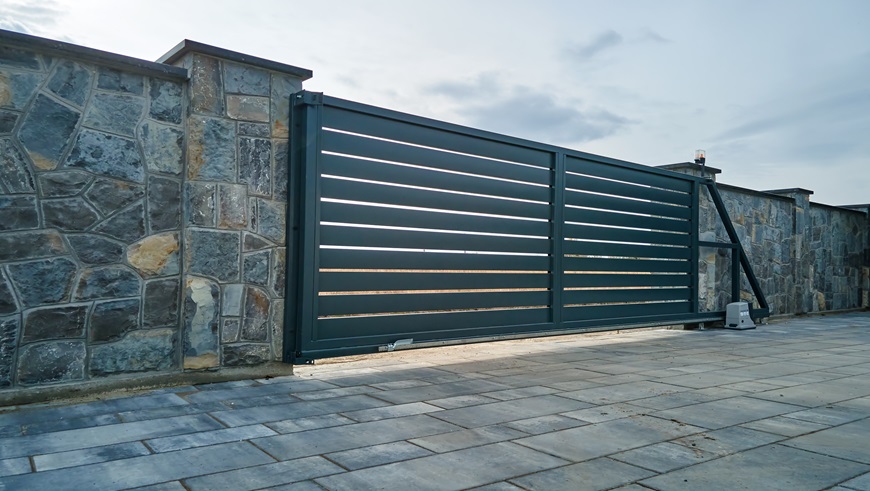
Table of Contents
How Much Does It Cost to Install an Electric Sliding Gate?
Electric sliding gates have become incredibly popular in recent years, mainly for their aesthetic and security purposes but also for ease of access and, in some cases, to help the disabled. Electric sliding gates are automated gates that slide from one side to another along a track to open and block an entrance or driveway.
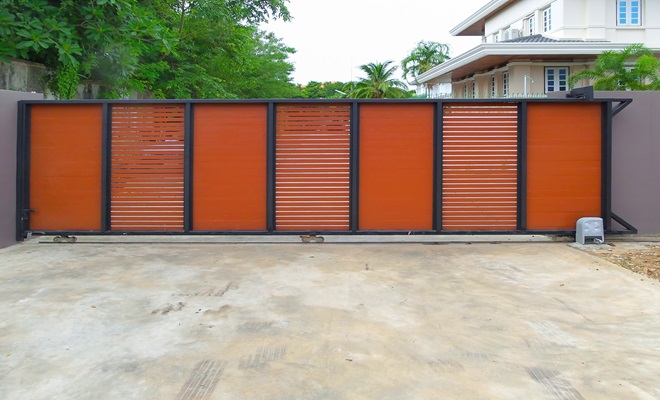
Traditional gates swing outwards on hinges, meaning they require lots of room and manual control. Electric sliding gates offer a space-saving means of security, along with easy operation through remote controls.
There are several types of electric sliding gates, all of which meet a very specific requirement.
Here are the main types:
- Single Sliding Gates: The traditional sliding gate consists of a single panel that will slide from one side to another to present an opening.
- Bi-Parting Sliding Gates: Similar to single sliding gates, bi-parting sliding gates consist of duo panels that slide from out to meet in the centre. This variation is ideal for wider entrances.
- Stacking Sliding Gates: With these electric sliding gates, the panels stack against a wall when closed or against one another when opened. This maximises the space available and, again, is a great option for wider entrances.
- Cantilever Sliding Gates: This variation of electric sliding gates is quite unique, as no ground track is necessary. Instead, the gate is supported by strong rollers. These are great options for uneven ground and for when you do not wish to have a ground track on show.
- Heavy-Duty Sliding Gates: Primarily designed for industrial use, these strong gates are incredibly durable and allow for high traffic, but they often lack some aesthetic qualities.
- Decorative Sliding Gates: If you’re less concerned with security and more concerned about increasing the ‘curb appeal’ of your home, these custom gates can be decorated with ornamental features to suit your needs.
In addition to these types of electric sliding gates, you can also opt for solar-powered electricity in any variation, which is not only an incredibly sustainable option but also an effective cost-saving method.
You can expect to pay between £1,900-£5,000 for a sliding gate, depending on a wide range of things. However, on average, it will cost around £2,000 to have one installed. Let’s delve deeper into those different cost-impact factors:
Gate Material
The material of the gate is the first point of consideration. You have a range of options, including increasing prices, from wood, steel, aluminium, and wrought iron. Wood is the cheapest option but comes with some maintenance work that will be ongoing throughout the life of the gate, mostly relating to weatherproofing.
Steel and aluminium are up next, with steel being marginally cheaper but aluminium being slightly lighter, meaning that over time, it will use less energy. Heavier and more expensive again is wrought iron electric sliding gates.
These are incredibly heavy and expensive, meaning they are not often opted for; however, for industrial purposes, the additional durability can be a key selling point.
Automation Type
The automation type can impact the price quite significantly, as this will be what powers your electric sliding gate. A basic electric motor will connect to your home’s electricity supply and power it from there. This is the cheapest option, but that isn’t to say it is ineffective or in any way less efficient.
Next, we have solar-powered electric gates. This option works the same as the basic motor, but instead of connecting to your home’s electricity supply, small solar panels on the gates will draw electricity for operation. You can have these connected to your home supply for a backup, but this is optional.
In addition to the two automation types above, many people will opt for the additional capability of a remote control operation. This will be connected up to your gates either with a small remote button in your car or home.
Groundwork Required
Of course, some preparation work is required to install electric sliding gates, but this varies from home to home, so you will need to get guidance and advice from the tradesman that you selected for a quote.
Access Control Systems
There are additional technologies and control systems that you can apply to your electric sliding gate system.
These include integrated security pin keypads, intercoms, both video and audio and smart home control systems, all of which you can pair up with everything from electric sliding gates to smart video doorbells and much more. Check out the table below for pricing details and ranges for options such as these.
Electric Sliding Gate Prices
| Item | Low Range | High Range | Average |
|---|---|---|---|
| Steel or Aluminium Electric Sliding Gates | £1,500 | £4,000 | £2,750 |
| Wood Electric Sliding Gates | £2,000 | £5,000 | £3,250 |
| Wrought Iron Electric Sliding Gates | £2,000 | £6,000 | £4,000 |
| Basic Electric Motor | £500 | £1,500 | £1,000 |
| High-end Solar Power Motor | £1,500 | £3,000 | £2,250 |
| Installation from a trained professional | £1,000 | £3,000 | £2,000 |
| Access Control Keypad and Intercoms | £200 | £800 | £500 |
| Security Cameras and Gate Sensors | £300 | £1,000 | £700 |
| Groundworks | £200 | £1,000 | £550 |
Additional Costs
Here are some additional cost you may come across while installing electric sliding gates:
Electrician Fees
You may require the help of an electrician to connect the electricity supply from the electric sliding gate to your home's electricity network. If you do require this, you can expect to pay around £30-£40 per hour, and the job will take between 1-4 hours.
Groundwork
As has been mentioned throughout the article, some homes require some groundwork to prepare the ground for the electric sliding gate installation. This can cost between £200-£1,000, depending on how much work is required.
Access Control System
You will more than likely want to add some access control systems over and above what comes as standard for better ease of access, visibility and security. This can cost anywhere between £200-£1,000 depending on the level of additional features you wish to install.
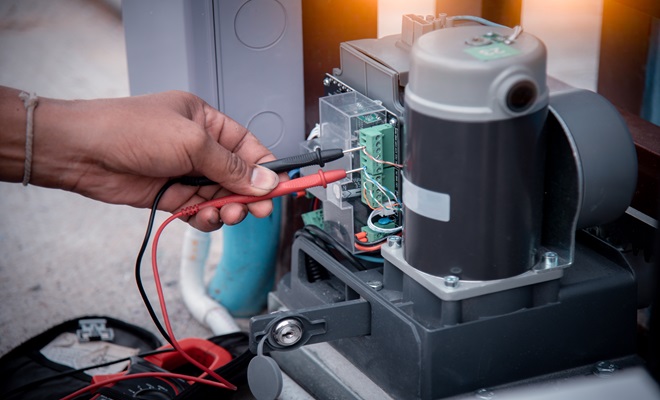
Maintenance Costs
Your electric sliding gate is a great investment, and as such, you will want to keep it maintained and working well throughout the year; 6 or 12-month services are advised and cost around £100. This will consist of a health check on the electric sliding gate, including all groundwork, tracks and motor.
Planning Permission
It is unlikely that you will require planning permission to install an electric sliding gate. However, if you live in a protected area or a listed building, you may have to seek this permission first. If you do, it will cost £258 for an application, which can take 10 weeks to provide an outcome.
Cost Breakdown Calculator
The total cost for electric sliding gates: £3,350
Aluminium Electric Sliding Gate
£2,345
Groundworks
£670
Electrician
£335
Labour Costs and Time Frames
The labour costs for the installation of an electric sliding gate are between £1,000-£3,000. Now, this depends on a few factors. First, the complexity of the gate that is being installed. If you opt for a gate that has many features and unique intricacies, it will be more time-consuming to install, and therefore, you will pay more in labour costs.
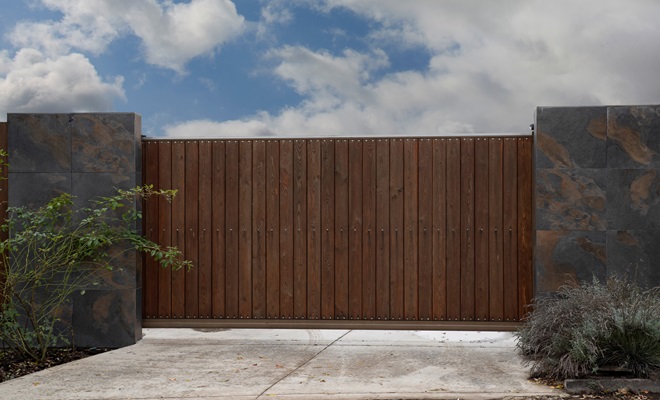
Next, the size of the gate being installed will again impact the length of time it takes to install due to the extra weight and ground to prepare, which leads us to the next consideration: the state of the ground that the electric sliding gate is being installed on. If this ground requires a lot of preparation work, you will pay additional labour fees.
It is worth bearing in mind some scenarios that may extend the timeframe provided for the installation. It should take between 2-5 days to install the electric sliding gate, depending on all the aforementioned factors. However, things like adverse weather could create issues and extend the length of the job.
Electric Sliding Gate Types
| Gate | Pros | Cons | Price |
|---|---|---|---|
| Single |
Simple to Install Utilises Space Only need one side access |
Only suitable for smaller openings It can be a little plain aesthetically |
£1,500 - £4,000 |
| Bi-Parting |
Simple to Install Utilises Space Effective for large openings |
Requires a lot of space It can be complex to install |
£2,000 - £5,000 |
| Stacking |
Simple to Install Utilises Space Effective for large openings Unique aesthetic |
Complex to install Has a lot of moving parts |
£2,000 - £5,000 |
| Cantilever |
Effective on all surfaces No ground track Powerful roller |
Complex installation Requires a lot of space Expensive |
£2,500 - £6,000 |
| Heavy-Duty |
Not aesthetically pleasing It may be too much for residential |
Very durable Perfect for industrial & commercial |
£3,000 - £6,000 |
| Decorative | Incredibly unique |
Can be expensive It can be complex to install |
£1,500 - £6,000 |
Installation Process
It requires careful planning to install an electric sliding gate and the specific groundwork to ensure that the gate operates smoothly, efficiently and safely.
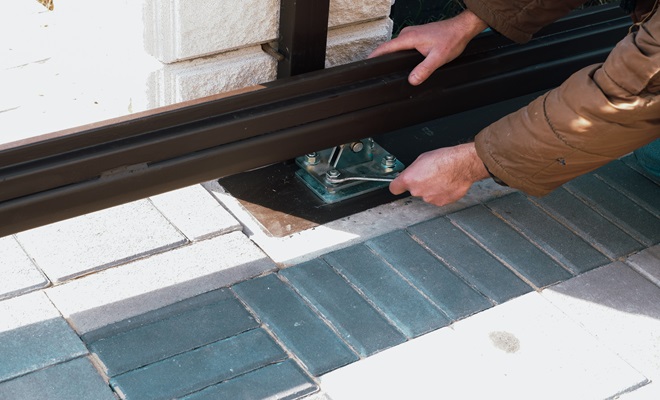
Here’s an overview of the installation process:
- Site Assessment - The professional will ensure that there is sufficient space on at least one side of the gate opening so that the gate can slide in when fully closed or open. This space should equal exactly the width of the gate plus additional room for essential hardware such as the motor and guide systems. It is crucial for the ground to be level here to avoid any motor damage unless you have opted for a cantilever gate.
- Foundation Preparation - A robust and level concrete base will be required for where the gate will slide. Typically, this will be in the form of a trench that is filled with concrete at least 200mm wide and 300mm deep. A separate concrete pad will be needed to mount the motor. This will be placed opposite to the opening and must be large enough to securely attach the motor.
- Electrical Installation - The power supply will be connected next, and the standard electric sliding gate will require 230V for a residential home. Conduits will be laid in the foundation for power cables and control wires, and they should be installed prior to the concrete's being poured.
- Drainage - Proper drainage will be installed into the system to ensure that there will be no standing water around the foundations and that a gradient for water diversion is installed.
- Track Installation - If using a tracked system, this will now be installed into the concrete before it cures fully. This will be level and aligned for efficient and smooth operation. For trackless gates, proper anchoring and support systems will be opted for in a cantilever system.
- Finishing - After the gate is installed, the surrounding area may require some restorative paving or landscaping work to ensure a fresh and professional finish.
DIY Installation
In many cases of home upgrades and instals, DIY or completing aspects of the job as a DIY project is supported. But in this scenario, the installation of an electric sliding gate is just too complex to be left to anyone other than a trained professional.
There is such high importance placed on things like levelling, tracking, and balance that even a slight discrepancy will reduce the effectiveness of the gate over time and lead to costly repair work. Additionally, working with high-powered electricity as a novice is dangerous and is not advised. A trained, professional installer should always be enlisted to install an electric sliding gate.
Compliance and Regulations
There are no compliance or building regulations to be aware of when installing an electric sliding gate; however, there are some general rules of thumb for this. Firstly, if you rent, then you should always seek approval from landlords or housing management before completing any permanent work.
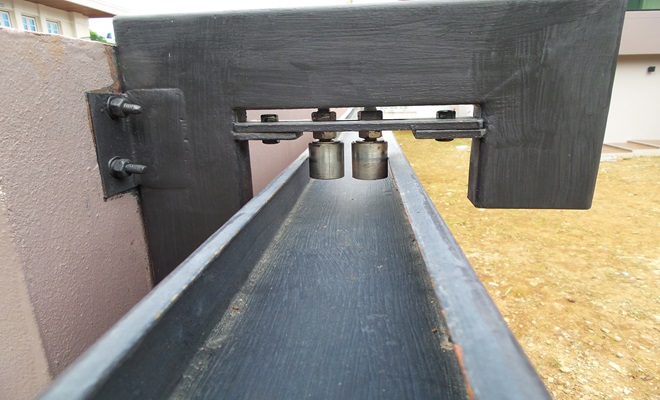
Similarly, if you live in a protected area or a listed home, you are unlikely to be able to complete the work without planning permission. This costs £258, and you can liaise with your local council to determine whether this is required.
FAQs
- Security: Sliding gates enhance security by creating a closed barrier that is difficult to climb over, and they can be integrated with access control systems like keypads, intercoms, or card readers for added security.
- Space: Since they slide rather than swing, they require less space, making them suitable for driveways or areas where a swing gate wouldn’t fit.
- Durability: Typically made from materials like steel, aluminium, or vinyl, they are designed to withstand weather conditions and provide long-lasting performance.
- Customisable: Electric sliding gates come in various designs, sizes, and materials, allowing homeowners to choose one that fits their design requirements and operational needs.
- Safety Features: Many models are equipped with safety sensors to prevent the closing of vehicles or pedestrians, ensuring safe operation.
Finding and Hiring a Professional
- Personal Recommendations - Personal recommendations can be invaluable. One of the most effective ways to find a trustworthy tradesperson is to ask friends or neighbours who have recently done similar work. Seeing the results of their projects firsthand gives you a great sense of the tradesperson’s skill and workmanship. Additionally, you can get their thoughts on the electric sliding gate that they had installed, which will ultimately help you make a more informed decision.
- Compare Multiple Quotes - Avoid committing to the first quote you receive. Instead, consult several professionals in your area and gather multiple estimates. This ensures you get a competitive price and may help you find someone knowledgeable about electric sliding gates who can offer advice based on your specific needs.
- Research Online Reviews - With the internet so accessible, researching potential hires is easier than ever. Check reviews and testimonials from previous clients. These reviews provide insight into the tradesperson’s reliability and skill, and you can often find examples of their past work to give you confidence in your choice.
- Utilise Social Media - Social media platforms like Facebook are great resources for finding reliable tradespeople. These platforms often feature genuine reviews from former clients, adding a layer of transparency that can boost your confidence in their services. Additionally, Facebook offers a feature where you can ask your network for recommendations. This allows friends to suggest professionals they’ve worked with before and opens up discussions about electric sliding gates, pricing, tips, ideas, and any other questions you may have.









